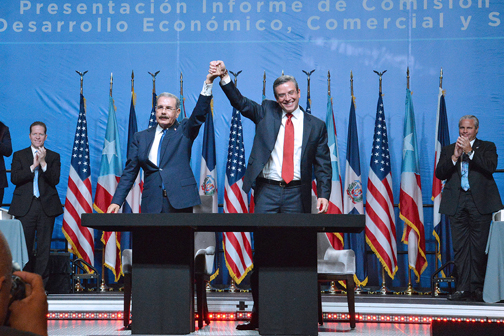PR, DR governments sign multiple bilateral agreements


Dominican Republic President Danilo Medina and Gov. García-Padilla mark the moment after signing the bilateral agreements.
The governments of Puerto Rico and the Dominican Republic signed Tuesday a series of bilateral agreements that seek to promote economic, academic, scientific, security, and cultural experiences between the two islands that share deep historical ties.
During his one-day visit, Dominican Republic President Danilo Medina, and an entourage of high-ranking government officials, met with Puerto Rican counterparts headed by Gov. Alejandro García-Padilla, who said the proximity between the two islands goes “beyond geography.”
“It’s time for us to give meaning to the substantive issues, to the proximities that contribute to improving the quality of life of our people. Today, we give meaning to economic, educational and social proximities that we’re willing to build, deepen, broaden on shared geography,” García-Padilla said in a message delivered after receiving and signing with Medina the report generated by the Joint Commission for Economic Development, Trade and Security outlining the issues that form part of the agenda for improving economies, education and quality of life in both islands.
With that being said, government officials rolled out the bilateral agreements that are expected to improve conditions for citizens in Puerto Rico and the Dominican Republic. They are summarized as follows:
- The Puerto Rico Treasury Department will work with the Dominican Republic’s General Tax Administration to develop activities to promote the exchange and use of organizational solutions and procedures as well as oversight methods to maximize revenue and avoid tax evasion. The agencies will define areas of interest that need to be addressed during annual reviews.
- The Puerto Rico State Department will work with the Dominican Republic’s Ministry of Higher Education to identify and ease opportunities between universities and educational centers through student exchanges, scholarships, conferences, joint projects and other related activities. The agreement creates a $500,000 fund to offer grants to Dominican students who complete their degrees in Puerto Rican universities.
- The Economic Development and Commerce Department will re-launch the Bilateral Trade and Investment Commission, established in 2003, to analyze the commercial balance between Puerto Rico and the Dominican Republic to identify business opportunities, eliminate barriers to doing business and identify incentive programs.
- The Department of Natural and Environmental Resources will work with Dominican counterparts to develop public policy to protect natural resources. They will share technical and regulatory support, exchange information, knowledge experiences and technologies to integrate best practices into the role of conserving the environment.
- The University of Puerto Rico will work with the Dominican Republic’s Ministry of Higher Education, Science and Technology to teach English.
- The Puerto Rico Emergency Management Administration will work with Dominican officials on prevention and response during natural disasters.
- The Puerto Rico Police Department will work with the Dominican Republic’s National Drug Control agency to fight drug traffic and money laundering.
- The governments will work on promoting and developing joint strategies to spur exports and investments between both islands.
- Separately, the Puerto Rico Farm Bureau announced that in coming weeks, it will meet with the head of the Dominican Farm Board to discuss opportunities in agriculture. Farm Bureau President Héctor Iván Cordero said the focus will be to exchange agricultural knowledge and techniques.
Talks between the current administration and that of Medina’s began in September, when García-Padilla traveled to the Dominican Republic for a series of meetings.
That was when the governments “reviewed the status of our relationship and discussed concrete actions to strengthen them,” said Medina during his address Tuesday afternoon.
“We firmly believe that our foreign relations should start with strengthening strong relationships with our neighboring people, which allow us all to win,” Medina said. “That’s why Puerto Rico undoubtedly occupies a high place in our agenda.”
Medina said the agreements are in line with his administration’s goals related to productivity and outside opportunities.
“It is not justifiable with our proximity that Puerto Rico would be buying elsewhere products that are part of the Dominican Republic’s offer, and vice versa,” he said.
Of the products Puerto Rico imports from the Caribbean, 61 percent are from the Dominican Republic. Meanwhile, 64 percent of Puerto Rico’s exports went to the neighboring island nation, according to La Fortaleza.
The Dominican Republic is one of the most prosperous economies in the Caribbean, registering a 7.1 percent growth in its GDP last year. Puerto Rico’s economy has shown little to negative growth for most of the past nine years.
Right to vote, open bank accounts
During his speech, García-Padilla announced plans to submit legislation to grant the right to vote to Puerto Rico residents, regardless of where they were born or their migratory status. He also said he will support legislation pending that grants all residents without a green card to open bank accounts.
“Our people of Dominican descent, and other nationalities, who currently have irregular migratory status not only face this barrier that prevents access to the formal financial system. They face even worse ones — democratic barriers,” the governor said.
His announcement drew immediate reaction from Resident Commissioner Pedro Pierluisi, who in a statement questioned the governor’s “lack of clarity and common sense.”
“One thing is to advocate for immigration reform in the United States for immigrants to legalize their residential status and another to create entirely unreasonable and unrealistic expectations,” Pierluisi said.
“On the other hand, one wonders what the governor’s priorities are when Puerto Ricans still can not vote for the president of the nation of which they are citizens, or elect representatives and vote in Congress, which passes laws that apply to their daily lives,” Pierluisi further said. “It seems he has failed to realize that in Puerto Rico nobody enjoys full democracy.”
He concluded by saying while he’s “always been an advocate for immigrant rights,” he opposes “improvisation and definitely think the priority should be to grant equality to American citizens residing in Puerto Rico.”






